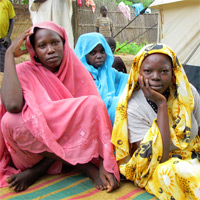
At the first quarterly review of Sudan policy by the Deputies Committee you will likely sense two very different assessments of what is happening in Sudan today. This divergence of opinion has major implications for your policy recommendations and decisions. One version of Sudan’s current reality will highlight recent agreements on the referendum law, high rates of voter registration, and the lack of village burnings and cross border adventurism in Darfur as demonstrations of tangible progress in Sudan.
The reality on the ground in Sudan speaks in starkly different terms. The dangerous status quo in Darfur remains unchanged in some key aspects: millions of people are left in squalid camps, unable to return home because government-supported militias occupy their land and make travel very dangerous. Women face high levels of sexual violence in Darfur, aid is erratic, and progress in the Darfur peace process remains painfully limited.
More broadly, the April national election in Sudan – an election for which the Unites States has provided tens of millions of dollars in technical assistance – is in the process of being stolen by an indicted war criminal who will use the ballot to “legitimize” his rule. The conditions to make the national election free and fair simply do not exist, and will not exist, by April, and there may well be sharp questions as to why the United States heavily bankrolled an election so obviously flawed.
Most urgently and ominously, there are abundant indicators that Sudan is on a dangerous road back to full-scale North-South war as violence increases and key elements of the Comprehensive Peace Agreement (CPA) have been left completely unimplemented. The international community’s position toward Sudan at this vital time reflects neither consensus nor coherence. Officials from both North and South speak of not wanting war, but are intensively preparing for it. Local clashes in South Sudan are escalating, against an historical backdrop of extensive support to southern Sudanese militias by the ruling party in Khartoum designed to undermine southern unity. The heavy lift of diplomacy needed to assure that Sudan’s referendum is peaceful and well managed simply remains largely undone, with no full-time, on-the-ground diplomatic teams from the U.S. engaging the regional actors on either the North-South issues or the Darfur process.
To prevent a full scale war from erupting in Sudan in the coming year, the Deputies should recommend to their superiors and President Obama a course of action marked by much deeper diplomatic engagement, backed by more assiduous efforts to build a multilateral coalition of counties willing to impose consequences on those undermining the path to peace in Sudan. On the occasion of this first quarterly policy review, we urge you to consider three main actions:
We want to personally thank you for all of the work that you continue to do to advance U.S. national interests and the cause of peace in Sudan, and thank you for your consideration.
John Prendergast
Omer Ismail
The Enough Project

